EFFORTS TO MAINTAIN SOCIAL STABILITY IN CHINA
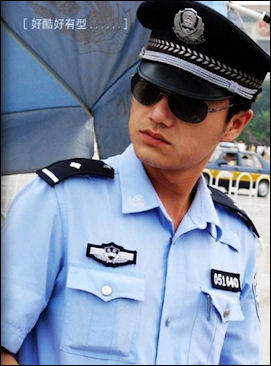
Wu Zhong wrote in the Asia Times: “Seeing instability at home as the greatest threat to its rule, the power center of the Chinese Communist Party has set up a permanent, high-profile institution to carry out the task of maintaining social order. Accordingly, governments at all levels have also set up special teams. Special funds have been allocated to the job, and an accountability system has been established to hold officials responsible for incidents of unrest within their jurisdictions. Authorities have stepped up efforts to prosecute individuals deemed potential threats to social stability.”[Source: Wu Zhong Asia Times, April 28, 2010]
“The high-profile institution, the Leading Group of Maintaining Social Stability was set up sometime in the 1990s (exactly when is not clear). The Office of Maintaining Social Stability is responsible for the group's daily operations. The office was first mentioned officially in a Xinhua news report in March 2008, in reference to a research report to top leaders about “unstable factors in foreign-invested enterprises on coastal regions”.”
As of 2010 the Leading Group of Maintaining Social Stability was headed by Zhou Yongkang, one of the nine members of the Politburo Standing Committee overseeing the country's law enforcement, who reported directly to Vice President Xi Jinping, tipped to succeed Hu as president, on issues concerning the maintenance of social order. Such high ranking leadership is an indication that social instability has increasingly become regarded as a serious nationwide problem.
“Besides establishing special task forces, China has also allocated special funds for maintaining stability. At this year's annual session of the National People's Congress (NPC) in March, the State Council for the first time revealed its budget for maintaining public security (and social stability). Expenditure would total 514 billion yuan (US$72 billion) in 2010, up 8.9 percent from 2009. This is almost equal to the central government's 518.6 billion yuan buget for defense. And the 8.9 percent growth in spending on public security is higher than the 7.5 percent increase in defense budget.”
Shortcomings of Efforts to Maintain Social Stability in China
“But such huge efforts and funding do not appear to be very effective in keeping society stable,” Wu wrote. “After 2005, Chinese authorities stopped publicizing statistics about “mass incidents”. This suggests that the number of protests may not have been cut significantly, or authorities would have had no hesitation in releasing figures and taking the credit.” [Source: Wu Zhong Asia Times, April 28, 2010]
“Some Chinese academics are now beginning to question Beijing's current policy. According to a China Youth Daily report on April 19, a research team in Tsinghua University's Sociology Department recently released a study saying Beijing had created a “vicious circle” in which the more the authorities institute efforts to maintain stability, the more unstable society becomes.”
“The researchers said this had happened because the rationale behind this policy was wrong. The government sees “mass incidents” or protests as threats to stability and its legitimacy to rule. But in most cases, people join demonstrations because they feel their own interests have been hurt; such as farmers who are deprived of their farmland, urban residents who are forced to move from their homes to make way redevelopment without reasonable compensation, and victims of major accidents who feel they failed to be sufficiently compensated.
“Under socialism, there were few personal interests to defend as the government took care of everything. But now China has built a market economic system in which anyone who feels their personal interests and rights have been violated has the motivation to complain. Hence, most, if not all, “mass incidents” are not politically oriented.”
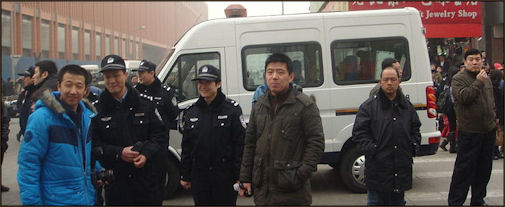
plain-clothed police at Wangfujing Street in Beijing
Improvements for Tackling Social Stability in China
“The study.” Wu wrote, “called on authorities to institutionalize a mechanism for people who feel their interests have been harmed to seek arbitration. (Here we may also add that the government should also consider setting up legal aid funds to help the disadvantaged file lawsuits). Authorities should also consider strengthen media supervision to increase pressure of public opinions on potential violations of people's interests, according to the study.”
“The study said the establishment and operation of special funds for maintaining stability in fact encourage more protests. This is because, under the accountability system, an official would have to take the blame if some major “mass incident” happens under his jurisdiction. Hence many local officials, in order not to be punished, would rather use the special funds to “buy over” potential protestors and “Seal off” their mouths. This is known as “using renminbi (the currency of the people) to deal with contradictions within renmin (people)”. Such actions encourage more people to protest, since they know that if they take to the streets - or threaten to do so - they may be offered compensation quickly.”
“The study also found that under the current policy the “costs” of maintaining stability will grow steadily and it was unfair that taxpayers should shoulder the increasingly heavier burden. And it concluded the time is ripe for Beijing to consider changing its mentality and policy on maintaining social stability. However, it stopped short of digging up a fundamental cause of conflict: namely, social injustice. In fact, many people's interests are harmed because of rampant abuse of power, the collusion of officials with business people, and unfair competition. This may perhaps be because it still remains too sensitive an issue for Chinese academics to openly discuss.”
“Nevertheless, the publication of such an outspoken study at least suggests that the communist government in China, perhaps frustrated by its failure in easing social conflicts, is more open to criticism of its policy in this regard and is listening to suggestions for improvement.”
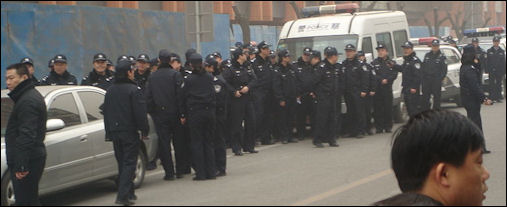
Police on Wangfujing Street in Beijing in February 2011
High Costs of Heavy Security in China
Reuters reported: “The Communist Party’s zeal in smothering dissent to maintain stability at all costs has created a domestic security system so expensive that it is sapping funds needed elsewhere to maintain the country’s economic health.” "Stability trumps everything," a Communist Party official told CNN. "We cannot be wishy-washy and just leave matters to chance."
The five year plan presented in March 2011 calls for spending on police, courts, prosecutors and other domestic security to rise 13.8 percent to $95 billion, exceeding the military budget. According to Willy Lam of the Jamestown Foundation, “China’s previous five-year plans were generally focused on the economy and little else, but this one had a lot to say about the Chinese Communist Party’s (CCP) new imperative of imposing tighter control over the populace.... The Blueprint contained lengthy sections on buttressing public security, tackling "mass incidents," as well as implementing "social management" (shehui guanli), which are code words for boosting socio-political stability. [Source: Willy Lam, Jamestown Foundation, China Brief, March 25, 2011]
Critics say the Communist Party’s reluctance to embrace political reforms will ultimately doom its efforts to create a more “harmonious society,” particularly if it can’t control officials who are the target of discontent.
China Boosts Domestic Security Spending by 11.5 Percent in 2012
In March 2012, Reuters reported: China will increase spending on police and other arms of "public security" by 11.5 percent to $111 billion in 2012, according to figures released that showed outlays on domestic law and order. The $111 billion to be spent on domestic security will be $5 billion more than the military will get. [Source: Reuters, Chris Buckley, March 5, 2012]
The numbers show how vigilant China's ruling Communist Party is against unrest, despite robust economic growth and years of budget rises for law-and-order agencies, which pushed outlays on them past military outlays for the first time in 2010.
The rise in China's budget for police, state security, armed militia, courts and jails and other items of "public security" was unveiled in the Ministry of Finance's report issued at the start of the annual parliamentary session.For 2012, China set combined central and local government spending on "public security" to 701.8 billion yuan, compared with 629.3 billion yuan in 2011, when it grew by nearly 13.8 percent. China will spend will boost defence spending by 11.2 percent this year to 670.3 billion yuan.
Beijing's Wei-Wen Imperative
Willie Lam of the Jamestown Foundation wrote in China Brief: “Beijing’s efforts to uphold socio-political stability — and to crush a potential Chinese-style Jasmine Revolutions — have dominated the March 2011 plenary session of the National People’s Congress (NPC). The Chinese parliament has approved a budget for wei-wen, an omnibus term that encompasses maintaining law and order, squashing dissent and keeping surveillance on the populace, which surpasses for the first time the expenditures of the People’s Liberation Army (PLA). Much of the initiatives for this year as well as for the 12th Five-Year Plan (12FYP) period of 2011 to 2015 have to do with pacifying disadvantaged social groupings through boosting their welfare entitlements and restructuring the economy. [Source: Willy Lam, China Brief, March 10, 2011]
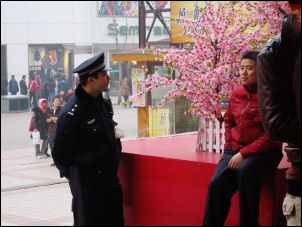
Wangfujing Street in Beijing “The 624.4 billion yuan ($95.0 billion) wei-wen budget for this year represented a jump of 13.8 percent over that of 2010. In comparison, the PLA budget stood at 601.1 billion yuan ($91.5 billion), a year-on-year rise of 12.7 percent. In his Government Work Report Premier Wen Jiabao asked government departments to “strengthen and perfect the public security system” and to “raise our ability in crisis management and withstanding [political] risks.” He also underscored the imperative of tightening control over the Internet and modernizing the Peoples Armed Police (PAP), one of whose duties is tackling riots and disturbances. “We must bolster our ability in tackling emergency incidents, countering terrorism and upholding stability,” Wen told the close to 3,000 deputies at the Great Hall of the People.
“The CCP administration seems ready to significantly raise the level of social-welfare benefits. Highlights of the 12th five year plan (FYP) , which have been released so far include more generous public spending in areas ranging from housing to medical insurance. For example, 36 million government-built subsidized apartments will be constructed in the coming five years. The central government’s annual contribution to medical insurance in urban and rural areas will be increased from 120 yuan ($18.38) per person to 200 yuan ($30.46) per person. Spending on education will reach 4 percent of the GDP from this year onwards. The minimum wage, which shot up by 20.8 percent last year, will rise by at least 80 percent by 2015. Most significantly, Wen’s cabinet has promised that the income of urbanites and peasants alike will increase by a yearly rate of not less than 7 percent, which is the projected GDP growth rate during the entire FYP period.
“More significantly, Wen and his colleagues have yet to come up with institutional measures to diffuse the masses’ malcontents. Take the hukou or residence permit system, which is responsible for the strict segregation of urban and rural residents since the mid-1950s. Despite the fact that some 200 million migrant workers have for the past two decades made invaluable contributions to China’s “world factory,” they are still denied permanent residence status in the cities... Similarly, the CCP administration has failed to grasp the nettle regarding the perennial battle against corruption, which is deemed a prime factor behind social unrest. In his pre-NPC discussion with Chinese Netizens, Wen admitted that “inflation coupled with corruption is enough to arouse people’s discontent — and this could even create severe social problems.”
Chris Buckley of Reuters wrote: “Firm control of discontent has been a defining policy of China's government, especially since the pro-democracy protests of 1989 that ended in a bloody crackdown and Party patriarch Deng Xiaoping's demand that "stability comes before all else." Rapid economic growth over the past two decades has rekindled official worries that social flux and inequality could unsettle Party control. President Hu chaired a meeting in September 2010 that studied the social strains facing the country. He warned officials to be ready for a rough patch. Yet the government's single-minded demand for officials to snuff out symptoms of unrest is skewing resources and attention away from social needs and into playing cop to monitor and detain potential protesters, say officials and experts. [Source: Chris Buckley, Reuters, October 14, 2010]
Beijing's Blueprint for Tackling Mass Incidents and Social Management
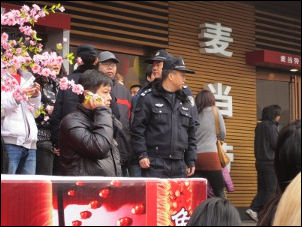
Wangfujing Street in Beijing Willie Lam of the Jamestown Foundation wrote in China Brief: “China’s previous five-year plans were generally focused on the economy and little else. Yet, the outline of the 12th Five-Year Blueprint on Economic and Social Development for 2011 to 2015 (hereafter Blueprint), which was released at the end of the National People’s Congress (NPC) in March 2011 — had a lot to say about the Chinese Communist Party’s (CCP) new imperative of imposing tighter control over the populace. The Blueprint contained lengthy sections on buttressing public security, tackling "mass incidents," as well as implementing "social management" (shehui guanli), which are code words for boosting socio-political stability.” [Source: Willy Lam, Jamestown Foundation, China Brief, March 25, 2011]
“The Blueprint began by pointing out that due to deep-seated changes in the domestic and global arenas, the Chinese leadership was "up against risks and uncertainties that are both anticipated and hard to foretell." "We must raise our consciousness about opportunities as well as risks — and take the initiative in adapting to changes in the environment," the document said. It added that Beijing "must effectively defuse various kinds of contradictions" in order to attain socio-economic goals in the coming five years. While the Blueprint enumerated challenges in fields ranging from resources and technology to human resources, it was obvious that internal political stability was a key concern.”
“The Blueprint disclosed for the first time the CCP leadership’s elaborate plans to build a nationwide "yingji xitong [rapid-response system] for tackling emergency incidents." The Blueprint pointed out that the planned yingji xitong "must be under a comprehensive, unified command, rationally structured, capable of nimble reactions — and that it must have guaranteed capability and high-efficiency operations." The "backbone" of this mechanism would consist of the police, People’s Armed Police (PAP) and People’s Liberation Army (PLA) officers. The latter would be supplemented by public security experts and professionals, full-time and part-time staff in security-related enterprises; as well as volunteers. While no deadline has been mentioned, this labyrinthine wei-wen ("upholding stability")...is expected to be put together by 2015.
“A related section of the Blueprint, which was devoted to the new concept of "social management," is focused on bolstering public order and harmony. As President Hu Jintao instructed at a Politburo meeting in February, social management was geared toward "promoting benevolent social order, and ensuring that society will be full of vigor on the one hand, and harmony and stability on the other." To this end, social-management offices are being set up nationwide: there will be at least one such unit for every major street in big cities as well as for each of the country’s 40,000-odd towns and rural townships. The Blueprint noted that apart from handling matters relating to public services and social-welfare provisions, the new offices would take charge of the "comprehensive treatment of law-and-order problems," enhancing socio-political stability, and handling petitions filed by citizens with grievances against party and government departments. It is envisaged that these social-management outfits will work closely with the Wei-Wen Offices that have been established in most provinces and major cities since 2008.
“The CCP’s much more aggressive approach to wei-wen requires the large-scale recruitment of volunteers. The Blueprint indicated that one out of ten residents in most community districts would become a "registered social volunteer." The massive deployment of wei-wen volunteers is apparently based on the experience of the Summer Olympics of 2008 and the Shanghai Expo of 2010, when up to 1 million vigilantes were recruited by the Beijing and Shanghai municipalities to maintain law and order. Also significant is the Blueprint’s recommendation that "social organizations" (shehui zuzhi), which is the official term of Chinese-style NGOs, be put under tighter government surveillance.”
“The Blueprint included a section on junmin ronghe, or the "synthesis between the military and civilians." The document laid utmost emphasis on "the fundamental principle and system of the party’s absolute leadership over army." It also highlighted the ideal of the "unity between the army and the government, as well as between the army and the people." Under the junmin ronghe rubric, the PLA and the PAP are free to tap economic, technological and human resources in civilian sectors in peacetime as well as during a national crisis.”
Crackdown After the Jasmine Revolution , See History
Chinese “Leading Groups”
Sarah Cook and Leeshai Lemish wrote in China Brief, “Since 1958, the CCP has used leading small groups (lingdao xiaozu) to coordinate and guide action on various issue areas. They are typically secretive, arbitrarily created and dissolved, and headed by members of the CCP Politburo Standing Committee. In 2008, Alice Miller counted eight such “primary” leading groups in operation, their responsibilities ranging from foreign affairs to economics, with subsidiary entities running down the Party’s system and State Council offices to execute policy. [Source: Sarah Cook, Leeshai Lemish, China Brief (Jamestown Foundation), vol. 11, no. 17, September 16, 2011]
There is however another key leading group strikingly out of character with the broad focus of each of the other leading groups: “The Leading Small Group for Preventing and Handling the Problem of Heretical Organizations (zhongyang fangfan he chuli xiejiao wenti lingdao xiaozu). Originally called “The Leading Small Group for Handling the Falun Gong Issue” (falun gong wenti lingdao xiaozu), the name change suggests its activity has expanded since 1999. Though Falun Gong remains the primary focus, its targets now include house church Christians, Buddhists and other religious or spiritual groups, and it has been renamed accordingly.
610 Office: Policing the Chinese Spirit
Sarah Cook and Leeshai Lemish wrote in China Brief,”Numerous official websites — in Beijing, Qingdao, Shandong, and Jiangsu among others — mention the 610 Office, an entity engaged in efforts to “carry out comprehensive investigations,” strengthen “transformation,” and prevent unwanted incidents. A June 2011 article in a reputable Chinese magazine briefly referenced the 610 Office as a key component of the Chinese Communist Party’s (CCP) “stability-preservation work.” What is the 610 Office? How and why did it come to exist? Why is it carrying out measures ostensibly under the purview of the Ministry of Public Security?The answers to these questions point to the establishment of a CCP-based, rather than a state-based, security organization, as well as a revival of the use of security agencies to enforce ideological compliance. Moreover, the 610 Office signifies a systemic arrangement by CCP leaders to avoid the reach of legal reforms when dealing with a perceived existential threat to their power. [Source: Sarah Cook, Leeshai Lemish, China Brief (Jamestown Foundation), vol. 11, no. 17, September 16, 2011]
The 610 Office’s beginnings lie partly in the CCP’s tradition of “leading groups.” The 610 Office was formed concurrently as the implementing body for The Leading Small Group for Handling the Falun Gong Issue and is named after the date of its creation: June 10, 1999. “Six-ten” functions outside the state system without any official standing. At its core, the 610 Office is a plainclothes CCP-based extra-ministerial security force focused on suppressing the Falun Gong spiritual group. The leading group sets the policy direction, which the 610 Office executes.
After featuring briefly in news articles in 2000, the 610 Office has since garnered only occasional international attention, leading to a common misperception that it is defunct. Recent evidence — including eyewitness accounts, official online documents, United Nations reports, and Congressional-Executive Commission on China (CECC) analysis — however, all points to an agency that remains active nationwide at all levels of Chinese governance. It was particularly involved in crackdowns surrounding the 2008 Beijing Olympics and the 2010 World Expo in Shanghai. Today, based on extrapolating from district-level numbers on local government websites, we estimate it retains at least 15,000 officers.
610 Office Created to Battle Falun Gong
Sarah Cook and Leeshai Lemish wrote in China Brief, “This office's story begins on June 7, 1999, when then-Party Secretary General Jiang Zemin called a special Politburo meeting. Jiang was determined to resolve what he perceived as a serious challenge to the regime’s authority, “something unprecedented in the country since its founding 50 years ago” that “did not occur even during the Cultural Revolution” by practitioners of the quasi-religious group Falun Gong. [Source: Sarah Cook, Leeshai Lemish, China Brief (Jamestown Foundation), vol. 11, no. 17, September 16, 2011]
In a June 7 directive, Jiang ordered the creation of a special leading group within the Party’s Central Committee to’swiftly handle and solve the “Falun Gong problem”.” He ordered that the team, placed under the responsibility of Politburo Standing Committee member Li Lanqing,”should immediately organize forces” and “get fully prepared for the work of disintegrating [Falun Gong]”. A few days later, the CCP also established an office to handle day-to-day operations. This office was internally named 610, or "liu yao ling" for its June 10 creation. No legislation was passed establishing it. No provisions formally outlined its mandate. This extralegal flexibility has proved critical in recent years, as its responsibilities have expanded.
Given that the CCP already had control over a range of security agencies and military forces, forming yet another entity seems unnecessary. Several factors may have contributed to Jiang’s decision: 1) Numbering in the tens of millions, Falun Gong practitioners included many individuals within the military and security establishment. This contributed to a sense that Falun Gong had quietly infiltrated the CCP and state apparatus. Jiang may have felt the need to create a trusted network of security agents to counter Falun Gong’s influence. 2) Given the task’s scale, Jiang needed an entity that would act quickly and forcefully with no holds barred. He may not have envisioned that twelve years later millions would still be practicing with new believers joining and the 610 Office seemingly permanent. 3) The creation of a new leading group quickly sent a signal down CCP ranks that countering Falun Gong was a new priority. 4) Given that the entire anti-Falun Gong campaign functioned outside Chinese law, Jiang needed a security force that could operate outside the existing legal system and its potential restrictions .
Over the following months, 610 Office branches were created throughout China and a chain of command emerged, closely linked to the Political-Legal Committee (PLC) structure. Hao Fengjun, a former 610 Office official selected from the Tianjin Public Security Bureau, stated that the office's orders come directly from the Party’s top echelons, then trickle down to cities and neighborhoods. Much of this structure overlaps with the CCP’s Political-Legal Committee (PLC). For example, after Li Lanqing retired in 2003, Jiang’s confidant and politburo member Luo Gan took over the leading group overseeing the 610 Office, while also heading the PLC. In 2007, Zhou Yongkang replaced him as head of both the leading group and the PLC.
Hao’s description of a nationwide network of 610 Office branches closely linked to the PLC apparatus is corroborated by a range of official sources. An online search reveals scores of recent references, pointing to the existence of active branches even in small cities and districts of Jiangxi, Guangdong, Zhejiang, and Shandong. A website of the Leiyang Municipal Party Committee in Hunan Province states its local 610 branch “reports to and is under the supervision of the municipal Party Committee’s Political-Legal Committee,” and is located in the Party Committee’s office building .
610 Office Goes After Falun Gong
Sarah Cook and Leeshai Lemish wrote in China Brief, “The 610 Office has two main functions: coordinating personnel at state institutions to assist in fulfilling the office's mandate and directly conducting operations against Falun Gong and other forbidden spiritual groups. The first coordination role can involve pressuring staff from state bodies to act according to the 610 Office’s wishes, even when these run counter to their legal authority. Several lawyers who have defended Falun Gong practitioners report 610 Office personnel subverting the ability of judges and prison wardens to carry out their duties as outlined by Chinese law. Attorney Jiang Tianyong says compromised judges decide Falun Gong cases without recourse to Chinese legal standards but, instead, based on extrajudicial intervention from the 610 Office. Meanwhile, Gao Zhisheng, Guo Guoting, and Wang Yajun have reported 610 Office interference in their efforts to meet with clients held in labor camps, prisons and detention centers . [Source: Sarah Cook, Leeshai Lemish, China Brief (Jamestown Foundation), vol. 11, no. 17, September 16, 2011]
Second, the 610 Office also has an immediate role in executing the leading group's policies. In the process, the 610 Office appears largely exempt from even the basics of China's judicial and legal reforms, often employing methods that are technically illegal under Chinese law. Various credible sources describe 610 Office agents directly participating in extrajudicial killings, torture, sexual assault, and illegal confiscation of property. For example, the 2009 report of the U.N. Special Rapporteur on Extrajudicial Killings cited 610 Office involvement in pre-Olympic cases of Falun Gong deaths in custody. Other Chinese dissidents and activists have detailed extra-legal detentions and torture on a scale and severity that appear to go beyond commonly-cited abuses in the law enforcement system.
610 Office activities also differ from those carried out under other leading groups in that its mandate does not relate to policy areas, like foreign affairs or economic reform. Rather, it targets Chinese citizens for thought reform. Millions of Falun Gong practitioners place their moral teachings, revolving around Truthfulness-Compassion-Tolerance, as their spiritual compass. CCP leaders arbitrarily deemed these beliefs “heretical” in 1999 and “transformation” quickly became a key aim of 610 Office operations. Like “patriotic education” tactics used in Tibet, the purpose of this ideological reprogramming is to break the will of subjects by coercing them — reportedly including physical and psychiatric torture, sleep deprivation and manipulation of family members — to renounce Falun Gong, profess loyalty to the CCP, and ultimately participate in the forced conversion of others.
Today, this objective remains fundamental to 610 operations, a testament to the Party’s difficulty crushing a decentralized groups of dedicated believers. In March, an analysis of local 610 Office-related references on official websites indicated that the Central 610 Office launched a renewed campaign to “transform” Falun Gong practitioners nationwide scheduled to last from 2010 to 2012.
610 Office Expands and Goes After Other “Heretical Organizations”
Sarah Cook and Leeshai Lemish wrote in China Brief, “The 610 Office’s operations long ago expanded beyond its core task of wiping out Falun Gong. Testifying before the European Parliament, Hao Fengjun said that in April 2003 Party leaders ordered the 610 Office to dispose of 28 other “heretical organizations” and “harmful qigong organizations”. The broadened functions remain in effect today as local government websites detail 610 Office investigations of other spiritual groups. [Source: Sarah Cook, Leeshai Lemish, China Brief (Jamestown Foundation), vol. 11, no. 17, September 16, 2011]
The expanded mandate points to the entrenchment of the 610 Office in the CCP apparatus. What began as a temporary leading small group and task force has become a permanent fixture. It also highlights how 610 Office’s existence undermines rule of law — whatever official state policy towards religion might be, this entity operates at the direction of a small group of CCP leaders with no official standing.
Such conclusions take on even greater significance at a time when the 610 Office may be serving as a model for new CCP initiatives. Since 2008, official reports, speeches and circulars have referenced a novel set of CCP “leading groups” maintaining stability. Reportedly, branches of the Office of Maintaining Stability “are being set up in every district and major street” in rich coastal cities. They are charged with “ferreting out “anti-CCP elements.”"
Multiple official sources indicate that these new entities and the 610 Office are working closely together. In at least one district in Guangdong’s Foshan City, for example, the 610 Office and the “leading group office for maintaining stability” were listed side-by-side in an online description of the local PLC’s internal functioning and staff. In some localities, staff and even the leadership of the two entities seem to overlap. A March 2010 notice from Zhejiang’s Pingyang County government states that the same person was appointed to direct both 610 Office and the local stability maintenance office.
Image Sources: BBC; China Digital Times, blogger Jessica
Text Sources: New York Times, Washington Post, Los Angeles Times, Times of London, National Geographic, The New Yorker, Time, Newsweek, Reuters, AP, Lonely Planet Guides, Compton’s Encyclopedia and various books and other publications.
Last updated November April 2012
